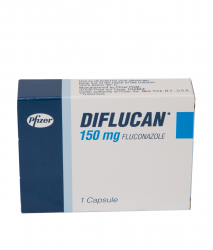Diflucan (fluconazole) Coupons, Discounts & Cost
Diflucan (fluconazole) is an antifungal drug that belongs to the class of triazole antifungal agents. One way to save money on the Diflucan (fluconazole) retail cost regardless of income and insurance status is to use Diflucan (fluconazole) coupons or discount cards from RXCoupons. Use our Diflucan (fluconazole) coupons at your online pharmacy and receive up to 75% off the sale price each time you refill your prescription.
What should you know about Diflucan (fluconazole)?
Diflucan (fluconazole) is an antifungal drug that belongs to the class of triazole antifungal agents. Fluconazole is used as treatment of fungal infections.
Diflucan (fluconazole) indications
- Cryptococcosis, including cryptococcal meningitis, skin and lung infections in patients with normal immune response, as well as in patients with various forms of immunodeficiency and AIDS; maintenance treatment for cryptococcal meningitis in AIDS patients; - Generalized candidiasis (candidemia, fungal eye infection), including candidiasis in cancer patients who are on therapy with immunosuppressive and cytotoxic agents, and patients with predisposition to candidiasis; - Candidal balanitis, genital candidiasis, vaginal candidiasis (acute or recurrent forms); - Candidiasis of the mucous membranes, including mouth, throat, esophagus, candiduria, chronic localized mucocutaneous candidiasis in patients with normal and impaired immune function; prevention of oropharyngeal candidiasis in AIDS patients; - Deep endemic mycoses (coccidioidomycosis, paracoccidioidomycosis, sporotrichosis and histoplasmosis) in patients with normal immune response; - Pityriasis versicolor, onychomycosis and candidal skin infection.
In addition, Diflucan is indicated for patients with malignant tumors for the prevention of fungal infection caused by either chemotherapy or radiation therapy.
Diflucan (fluconazole) contraindications
Diflucan (fluconazole) should not be used with terfenadine and cisapride. It should be avoided when breastfeeding. Diflucan is also contraindicated in case of hypersensitivity to fluconazole and drugs in the azole class similar to fluconazole. It is necessary to avoid using Diflucan during pregnancy.
Use with caution in case of functional disorders of the liver in patients receiving fluconazole; in patients with superficial fungal infections and systemic fungal infections, in patients with multiple risk factors (organic heart disease, electrolyte imbalance).
How to use Diflucan (fluconazole)
Diflucan (fluconazole) is available in the form of gelatin capsules, powder for suspension, Solution for intravenous infusion. The dosage form and the duration of treatment depend on the clinical condition of the patient and should be determined individually by your doctor.
The recommended dosage for adult patients: Cryptococcal meningitis and other cryptococcal infection: 400 mg during the first day, followed by 200-400 mg 1 time per day. The duration of treatment is usually 6-8 weeks. Candidemia, disseminated candidiasis and invasive candidiasis: 400 mg during the first day, then 200 mg per day (the dose can be increased to 400 mg per day). Vaginal candidiasis and candida balanitis: a single oral dose of 150 mg, and then 150 mg once in 4 weeks (the duration can range from 16 weeks to one year). Oropharyngeal candidiasis: 50-100 mg 1 time a day for 7-14 days. Patients with AIDS should use 150 mg 1 time per week (the duration is determined by the doctor individually). Atrophic oral candidiasis: 50 mg 1 time a day for 14 days. Non-invasive bronchopulmonary infection, esophagitis, candiduria, candidiasis of the skin and mucous membranes (except genital candidiasis): 50-100 mg per day for 14-30 days. Skin infections, including mycosis: 150 mg 1 time per week or 50 mg 1 time a day for 2-4 weeks. Pityriasis versicolor: 300 mg 1 time per week for 2-3 weeks or 50 mg 1 time per day for 2-4 weeks. Deep endemic mycoses: 200-400 mg per day (the duration is determined by the doctor individually). Onychomycosis: 150 mg 1 time per week. Prevention of candidiasis: from 50 to 400 mg 1 time a day.
The recommended dosage for children: Mucosal candidiasis: 6 mg per 1 kg body weight during the first day, then 3 mg per 1 kg per day. Generalized candidiasis and cryptococcal infection: 6-12 mg per 1 kg body weight per day. Prevention of fungal infections: 3-12 mg per 1 kg body weight per day.
Diflucan (fluconazole) side effects
Cardiovascular system: atrial or ventricular fibrillation. Nervous system: dizziness, headache, convulsions. Digestive system: nausea, vomiting, abdominal pain, flatulence, diarrhea, dyspepsia, hepatic dysfunction, hepatocellular necrosis, jaundice, hepatitis. Metabolism: hypokalemia. Dermatological reactions: alopecia, rash, toxic epidermal necrolysis and Stevens-Johnson syndrome. Allergic reactions: facial edema, angioneurotic edema, pruritus, urticaria, other anaphylactic reactions.
Diflucan (fluconazole) warnings
The drug should be discontinued in case of clinical symptoms of liver damage. Women of childbearing age must use an effective contraceptive during treatment. Patients with heart disease, liver and kidney failure should consult a physician before using this drug. The drug may cause anaphylactic reaction (in rare cases).

